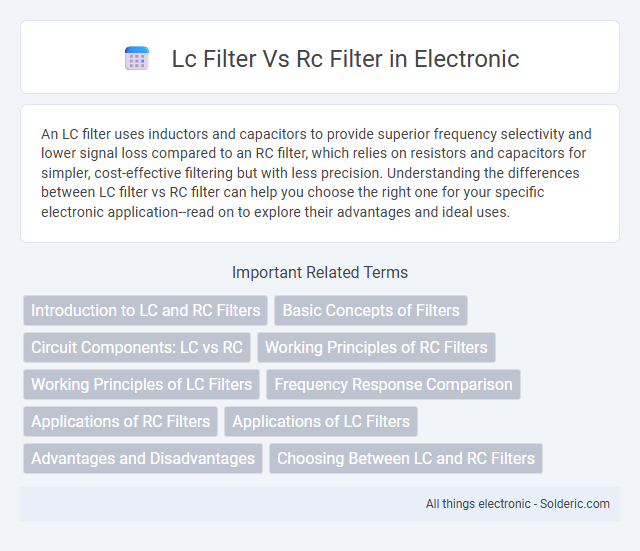An LC filter uses inductors and capacitors to provide superior frequency selectivity and lower signal loss compared to an RC filter, which relies on resistors and capacitors for simpler, cost-effective filtering but with less precision. Understanding the differences between LC filter vs RC filter can help you choose the right one for your specific electronic application--read on to explore their advantages and ideal uses.
Comparison Table
| Feature | LC Filter | RC Filter |
|---|---|---|
| Components | Inductor (L) and Capacitor (C) | Resistor (R) and Capacitor (C) |
| Frequency Response | Sharp cutoff, better selectivity | Smoother cutoff, less selective |
| Power Loss | Low loss due to inductors | Higher loss due to resistors |
| Application | High-frequency filters, tuning circuits | Simple low-pass or high-pass filters |
| Cost | Higher due to inductors | Lower cost, easy to implement |
| Size | Generally larger because of inductors | Compact and smaller |
| Impedance | Frequency-dependent, can be complex | Fixed resistor impacts impedance |
Introduction to LC and RC Filters
LC filters use inductors and capacitors to achieve selective frequency filtering with low signal loss and high Q factor, making them ideal for high-frequency applications. RC filters consist of resistors and capacitors, providing simpler design and cost-effectiveness but with higher signal attenuation and lower quality factor. Your choice between LC and RC filters depends on the trade-offs in frequency response, signal integrity, and component size for your specific application.
Basic Concepts of Filters
LC filters use inductors (L) and capacitors (C) to create resonant circuits that efficiently reject or pass specific frequency ranges, offering low resistance and high selectivity. RC filters combine resistors (R) and capacitors (C) to form simpler, less selective frequency filters that are easier to design and cost-effective for high-frequency applications. The fundamental difference lies in LC filters' ability to achieve sharper cutoff slopes and lower losses compared to the typically gentler roll-off of RC filters.
Circuit Components: LC vs RC
LC filters use inductors (L) and capacitors (C) to achieve sharper frequency selectivity and better quality factor (Q) compared to RC filters, which rely solely on resistors (R) and capacitors (C). Inductors in LC filters offer low energy loss and higher impedance at certain frequencies, enabling effective filtering of undesired signals. Your choice depends on the application's requirements for selectivity, signal attenuation, and power handling.
Working Principles of RC Filters
RC filters operate by using a resistor and capacitor in a specific arrangement to control signal frequencies; the resistor limits current while the capacitor stores and releases energy, creating frequency-dependent impedance. This design allows RC filters to attenuate undesired frequencies, either blocking high frequencies in low-pass filters or blocking low frequencies in high-pass filters. You can utilize RC filters in audio systems and signal processing to isolate or remove certain frequency ranges effectively.
Working Principles of LC Filters
LC filters utilize inductors (L) and capacitors (C) to effectively block unwanted frequencies by creating resonant circuits that allow selective frequency transmission. The inductor opposes changes in current, while the capacitor opposes changes in voltage, together forming a frequency-dependent impedance that filters signals based on resonance. You can achieve sharper frequency cutoffs and better signal quality with LC filters compared to RC filters, which rely solely on resistors and capacitors.
Frequency Response Comparison
LC filters offer sharper frequency response curves with steeper roll-off rates compared to RC filters due to the inductance providing higher selectivity and better attenuation of unwanted frequencies. RC filters typically exhibit a more gradual slope, limiting their effectiveness in applications requiring precise cutoff frequencies or narrow bandwidths. The resonant frequency of LC filters allows for more efficient filtering in both low-pass and band-pass configurations, making them preferable in radio frequency and high-frequency circuits.
Applications of RC Filters
RC filters are widely used in audio equipment for tone control and signal conditioning, effectively attenuating unwanted frequencies while preserving desired signals. They serve essential roles in analog circuits, such as smoothing power supply noise and shaping frequency response in communication devices. Their simplicity and low cost make RC filters ideal for applications requiring moderate filtering without the complexity of inductors.
Applications of LC Filters
LC filters are widely used in radio frequency (RF) applications for signal processing due to their high selectivity and low insertion loss. They are essential in wireless communication systems, including transmitters and receivers, to eliminate unwanted frequencies and improve signal clarity. Additionally, LC filters play a critical role in power supplies and audio equipment for smoothing signals and reducing noise.
Advantages and Disadvantages
LC filters provide superior frequency selectivity and lower power loss compared to RC filters due to their inductive and capacitive components, making them ideal for high-frequency applications. However, LC filters are bulkier, more expensive, and can introduce electromagnetic interference, limiting their use in compact or low-cost designs. RC filters offer simplicity, reduced size, and cost-effectiveness but suffer from lower selectivity and higher signal attenuation, making them suited for low-frequency or audio applications.
Choosing Between LC and RC Filters
Choosing between LC and RC filters depends on the frequency range and performance requirements of the application. LC filters provide higher selectivity and lower power loss at high frequencies due to their inductive and capacitive components, making them ideal for RF and microwave circuits. RC filters are simpler, cost-effective, and better suited for low-frequency applications where size and power considerations are critical.
lc filter vs rc filter Infographic

 solderic.com
solderic.com